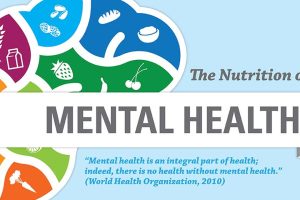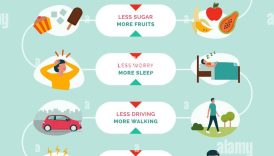Exploring the Link Between Nutrition and Mental Health

Overview of Nutrition and Mental Health
Nutrition plays a pivotal role in shaping mental health, highlighting the intricate connections between what we eat and how we feel. For instance, many individuals report feeling more energetic and emotionally stable when consuming a balanced diet rich in whole foods. Consider the following points:
- Exploring the Link Between Nutrition and Mental Health
- Overview of Nutrition and Mental Health
- The Impact of Diet on Mental Health
- Influence of Macronutrients
- Importance of Micronutrients
- Gut Health and its Relationship to Mental Health
- Gut-Brain Axis
- Role of Omega-3 Fatty Acids in Mental Well-being
- Benefits of Omega-3 Fatty Acids
- Foods to Boost Mood and Cognitive Function
- Superfoods for Mental Health
- The Connection Between Sugar and Mental Health
- Effects of Excessive Sugar Intake
- Importance of Hydration for Brain Function
- Dehydration and Cognitive Performance
- Mediterranean Diet and Mental Health
- Components of the Mediterranean Diet
- Impact of Probiotics on Mental Health
- Gut Microbiota and Mood
- Vegan and Vegetarian Diets for Psychological Well-being
- Nutrient Considerations for Plant-Based Diets
- Nutritional Strategies for Stress Management
- Adaptogenic Foods and Herbs
- XII. Eating Disorders and Mental Health
- Nutritional Rehabilitation
- XIII. The Role of Caffeine in Mental Health
- Effects of Caffeine on Anxiety and Sleep
- XIV. Mindful Eating for Emotional Wellness
- Practices to Improve Eating Habits
- Conclusion
- Summary of Key Findings
- Nutrient-Dense Foods: Foods high in vitamins, minerals, and antioxidants promote brain function.
- Mood Regulation: Certain nutrients, like omega-3 fatty acids, have been linked to the alleviation of mood disorders.
- Gut Health: A healthy gut can influence our mental states through the production of neurotransmitters.
These insights pave the way for a deeper exploration into how dietary choices can significantly influence mental well-being.
The Impact of Diet on Mental Health
Influence of Macronutrients
The complexities of mental health can often be traced back to our diets, particularly the macronutrients we consume. Macronutrients—proteins, carbohydrates, and fats—each play distinct roles in brain function and emotional stability.
- Proteins are crucial for neurotransmitter synthesis, influencing mood regulation.
- Healthy Carbohydrates provide a steady energy source, preventing mood swings.
- Fats, especially healthy fats, support brain structure and function.
Reflecting on personal experiences, individuals may notice improved focus and reduced anxiety when maintaining a balanced intake of these macronutrients.
Importance of Micronutrients
Micronutrients, while needed in smaller quantities, are equally vital in supporting mental health. Vitamins and minerals can significantly affect how we feel and function daily. Some key micronutrients include:
- Vitamin D: Known as the sunshine vitamin, it’s linked to mood elevation.
- B Vitamins: Essential for energy production and brain function, deficiencies can lead to depression.
- Magnesium: Plays a critical role in brain health, helping to regulate mood and stress responses.
Incorporating a variety of nutrient-rich foods into daily meals can help uplift our mental health, creating a solid foundation for emotional well-being.
Gut Health and its Relationship to Mental Health
Gut-Brain Axis
The connection between gut health and mental health is becoming increasingly clear, primarily through the concept of the gut-brain axis. This intricate communication system links the gastrointestinal tract and the brain, showing how our digestive health can significantly impact our moods and cognitive functions. Many individuals may notice feeling more anxious or sluggish after unhealthy eating periods, which is no coincidence. Key components of this relationship include:
- Microbiota: Healthy gut bacteria produce neurotransmitters like serotonin, which regulate mood.
- Inflammation: Gut issues can lead to systemic inflammation, potentially affecting mental health.
- Nutrition: A balanced diet promotes good gut health, fostering a positive feedback loop.
For those seeking emotional stability, nurturing gut health through probiotic-rich foods such as yogurt or fermented items like kimchi can be a game changer, further bridging the gap between diet and mental wellness.
Role of Omega-3 Fatty Acids in Mental Well-being
Benefits of Omega-3 Fatty Acids
Transitioning from the gut-brain connection, it’s crucial to highlight the role of omega-3 fatty acids in mental health. These essential fats, found in sources like fish, flaxseeds, and walnuts, are powerhouse nutrients that significantly influence brain function and emotional stability. Many individuals have found that incorporating omega-3s into their diets helps alleviate symptoms of anxiety and depression. Consider the numerous benefits:
- Anti-Inflammatory Properties: Omega-3s can reduce inflammation in the brain, promoting clearer thinking.
- Neurotransmitter Regulation: They help maintain the balance of mood-regulating neurotransmitters.
- Cognitive Function: Studies suggest that regular intake improves memory and cognitive performance.
By opting for meals rich in omega-3s, such as salmon or chia seed pudding, people may enhance not just their physical health but their mental resilience as well. These small dietary adjustments can lead to significant improvements in overall well-being.
Foods to Boost Mood and Cognitive Function
Superfoods for Mental Health
Building on the importance of omega-3 fatty acids, let’s delve into superfoods that can further enhance mood and cognitive function. These nutrient-dense foods are not just tasty; they’re packed with compounds that support brain health and emotional well-being. Here are some standout superfoods:
- Blueberries: Rich in antioxidants, they are linked to improved memory and cognitive function. A handful can make for a delicious and brain-boosting snack.
- Dark Chocolate: This indulgent treat contains flavonoids that can enhance mood and concentration. Just a small square can elevate your spirits!
- Leafy Greens: Foods like spinach and kale are high in folate, which has been associated with a reduced risk of depression. Adding these to salads can provide a nutrient-packed boost.
Incorporating these superfoods into daily meals can foster not only better brain health but also a happier state of mind, creating a holistic approach to mental wellness.
The Connection Between Sugar and Mental Health
Effects of Excessive Sugar Intake
Transitioning from the benefits of superfoods, it’s essential to address the darker side of our diets: excessive sugar intake. While that sugary treat may offer a quick burst of energy or happiness, the aftermath can dramatically affect mental health. Research shows that high sugar consumption is linked to several adverse effects:
- Mood Swings: Sugar can cause rapid spikes and crashes in blood sugar levels, leading to irritability and mood fluctuations.
- Increased Anxiety: Studies suggest that diets high in sugar may exacerbate anxiety symptoms over time.
- Cognitive Decline: Excessive sugar can impair cognitive function, making it challenging to focus or retain information.
Many people have experienced feelings of lethargy or even sadness following a sugar binge, signaling the importance of moderation. By prioritizing a balanced diet and limiting refined sugars, individuals can support their mental health more effectively, creating a more stable emotional landscape.
Importance of Hydration for Brain Function
Dehydration and Cognitive Performance
Continuing from the sweet effects of sugar on mental health, let’s now turn our attention to hydration—a crucial but often overlooked aspect of cognitive function. Just as nutrient-dense foods support the brain, staying hydrated is vital for optimal mental performance. Dehydration can significantly impact cognitive abilities and mood. For instance:
- Concentration Issues: Even mild dehydration can lead to difficulties in focusing and maintaining attention.
- Memory Problems: Studies show that a lack of sufficient water intake can hinder short-term memory.
- Increased Fatigue: When the body is dehydrated, energy levels drop, which can lead to feelings of lethargy or irritability.
Many individuals may not realize how a simple glass of water can refresh not only their bodies but also their minds. By making hydration a priority—perhaps starting each day with water and keeping a bottle handy—people can enhance their cognitive performance and maintain emotional stability throughout the day.
Mediterranean Diet and Mental Health
Components of the Mediterranean Diet
Shifting focus from hydration, one of the most celebrated eating patterns that can profoundly benefit mental health is the Mediterranean diet. This diet not only emphasizes delicious, fresh foods but also incorporates habits that promote overall well-being. Key components include:
- Fruits and Vegetables: A colorful array of produce rich in vitamins and antioxidants that support brain health and mood regulation.
- Whole Grains: Foods like brown rice, quinoa, and whole-grain bread provide steady energy and stabilize blood sugar levels.
- Healthy Fats: Olive oil, nuts, and fatty fish are abundant in omega-3s, known for their role in enhancing cognitive function.
- Fermented Foods: Items such as yogurt and kefir contribute to gut health, which is closely linked to mental wellness.
Adopting the Mediterranean diet can be a delightful way to nourish both body and mind. Many who enjoy this lifestyle often report improved mood stability and better overall mental health, making it an enticing choice for those looking to boost their emotional resilience.
Impact of Probiotics on Mental Health
Gut Microbiota and Mood
Following our exploration of the Mediterranean diet, it’s time to delve into the fascinating role of probiotics and their impact on mental health. Today, research increasingly supports the idea that our gut microbiota— the vast community of microorganisms in our intestines—plays a crucial role in regulating mood and emotional well-being. Consider these key points:
- Serotonin Production: About 90% of serotonin, a neurotransmitter essential for mood regulation, is produced in the gut, making gut health paramount.
- Gut-Brain Communication: The gut microbiota communicates with the brain, influencing stress responses and overall mental clarity.
- Probiotic Sources: Foods like yogurt, kefir, and sauerkraut are excellent sources of beneficial bacteria that can enhance gut health.
Many individuals report feeling happier and more balanced after incorporating probiotics into their diets. This connection underscores the importance of gut health not just for physical wellness but also as a powerful contributor to mental resilience.
Vegan and Vegetarian Diets for Psychological Well-being
Nutrient Considerations for Plant-Based Diets
Building on the powerful link between gut health and mental wellness, let’s explore how vegan and vegetarian diets can also contribute to psychological well-being. While these diets offer numerous health benefits, it’s vital to be mindful of specific nutrient needs that are crucial for mental health. Here are some key nutrients to focus on:
- Vitamin B12: Often lacking in plant-based diets, it’s essential for brain health and energy levels. Fortified foods or supplements can help.
- Iron: Important for cognitive function, incorporate sources like lentils, chickpeas, and spinach to ensure adequate intake.
- Omega-3 Fatty Acids: While commonly found in fish, plant-based sources like chia seeds and flaxseeds can offer beneficial omega-3s.
Many people find that a well-planned vegan or vegetarian diet, rich in these nutrients, results in improved mood and vitality. By being mindful of nutrient intake, individuals can sustain their emotional health and reap the rewards of a plant-based lifestyle.
Nutritional Strategies for Stress Management
Adaptogenic Foods and Herbs
Now that we’ve discussed the nutritional needs for vegan and vegetarian diets, let’s dive into nutritional strategies for managing stress. Adaptogenic foods and herbs have gained attention for their unique ability to help the body adapt to stress and promote a sense of calm. Here are some notable adaptogens to consider:
- Ashwagandha: Often used in traditional medicine, this herb may reduce anxiety and increase resilience to stress.
- Rhodiola Rosea: Known for its potential to enhance mood and energy levels, Rhodiola can help combat fatigue associated with stress.
- Holy Basil: This fragrant herb is believed to help lower cortisol levels, the stress hormone, promoting a more balanced emotional state.
Many individuals have found that incorporating these adaptogenic herbs into their daily routines—whether in teas, smoothies, or meals—provides a sense of grounding and relief from the pressures of daily life. By embracing these natural allies in stress management, one can foster an overall sense of well-being.
XII. Eating Disorders and Mental Health
Nutritional Rehabilitation
Transitioning from the role of adaptogens in stress management, it’s crucial to address the serious topic of eating disorders and their complex relationship with mental health. Nutritional rehabilitation plays a vital role in the recovery process for individuals struggling with these disorders. Key components of nutritional rehabilitation include:
- Individualized Meal Plans: Tailored plans focus on reestablishing healthy eating patterns, ensuring necessary nutrient intake without triggering anxiety.
- Therapeutic Support: Working with dietitians and mental health professionals helps address the psychological roots of disordered eating.
- Mindful Eating Practices: Encouraging awareness around food choices fosters a healthier relationship with eating, shifting focus from restriction to nourishment.
Many individuals have experienced transformation through nutritional rehabilitation, regaining not only physical health but also emotional stability. By prioritizing comprehensive care, those affected can find a path toward recovery that nurtures both the body and mind.
XIII. The Role of Caffeine in Mental Health
Effects of Caffeine on Anxiety and Sleep
Following our discussion on nutritional rehabilitation for eating disorders, it’s important to shine a light on caffeine and its nuanced impact on mental health. While many of us rely on that morning cup of coffee to kickstart our day, caffeine can affect anxiety levels and sleep quality in significant ways. Consider these effects:
- Anxiety Increase: For some individuals, excessive caffeine can heighten feelings of anxiety and restlessness, making it essential to monitor intake.
- Sleep Disruption: Consuming caffeine in the afternoon or evening can interfere with sleep patterns, leading to insomnia or poor-quality sleep.
Many people have noticed a difference in their mood and stress levels by reducing caffeine or opting for alternatives like herbal teas. Understanding these effects can empower individuals to make informed choices that support their mental wellness consistently, contributing to better overall health.
XIV. Mindful Eating for Emotional Wellness
Practices to Improve Eating Habits
Building on the role of caffeine in mental health, let’s transition to the concept of mindful eating, a transformative practice that can profoundly enhance emotional wellness. Mindful eating encourages individuals to take a step back and truly engage with their food, fostering a more positive relationship with eating. Here are some effective practices to embrace:
- Slow Down: Take your time during meals; savor each bite. This can enhance enjoyment and help recognize hunger cues.
- Limit Distractions: Put away devices and focus on the meal itself. This simple act can promote greater awareness of portion sizes and satisfaction.
- Tune Into Sensations: Pay attention to flavors, textures, and smells. This sensory engagement can elevate the eating experience.
Many individuals report feeling more connected to their bodies and emotions through mindful eating. By integrating these practices into daily life, one can nurture both physical health and emotional resilience, creating a foundation of wellness that extends beyond the plate.
Conclusion
Summary of Key Findings
As we conclude our exploration into the intricate relationship between nutrition and mental health, it’s clear that our dietary choices significantly influence emotional wellness. From understanding the impact of macronutrients and micronutrients to recognizing the benefits of mindful eating, each aspect plays a vital role. Key findings include:
- Balanced Diet: Emphasizing whole foods enhances brain function and mood stability.
- Hydration Matters: Staying hydrated is essential for cognitive performance and emotional well-being.
- Mindful Practices: Engaging in mindful eating fosters a healthier relationship with food and emotions.
By fostering greater awareness of these connections, individuals can make informed dietary choices that not only nurture their bodies but also cultivate a more resilient and positive mental state. Embracing these principles can lead to lasting improvements in overall health and happiness.





